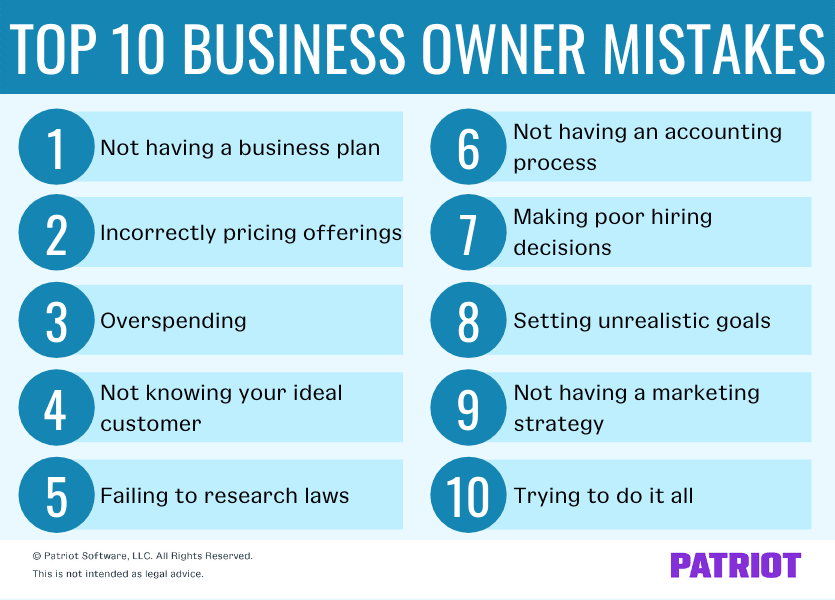Mistakes Small Business Owners Make

The entrepreneurial dream, a beacon of independence and financial freedom, often flickers and fades for many small business owners. While passion and hard work are crucial ingredients, a startling number of businesses fail within their first five years. A recent study by the Small Business Administration (SBA) revealed that roughly 50% of new businesses don't make it past this critical milestone. These failures are not solely attributed to market forces; often, they stem from avoidable mistakes made by the owners themselves.
This article delves into the most common pitfalls that trip up small business owners. We will use insights from expert analysis, industry reports, and real-world examples to expose these errors. Understanding these mistakes, from inadequate financial planning to neglecting customer relationships, is the first step towards building a more resilient and successful business.
Financial Mismanagement: A Recipe for Disaster
One of the most prevalent errors is poor financial management. Many entrepreneurs underestimate the capital required to launch and sustain their operations.
They fail to create realistic budgets, track expenses meticulously, or anticipate cash flow shortages. A lack of financial discipline can quickly lead to insolvency, regardless of a business's potential.
Insufficient Capitalization and Cash Flow Problems
Starting a business on a shoestring budget is a high-risk strategy. Underestimating startup costs and operating expenses can leave businesses vulnerable to even minor economic downturns. Without adequate cash reserves, covering unexpected expenses or bridging seasonal sales dips becomes impossible.
This often leads to debt accumulation and ultimately, closure.
Neglecting Bookkeeping and Financial Analysis
Many small business owners delay or delegate bookkeeping tasks, viewing them as a necessary evil rather than a crucial management tool. However, accurate and timely financial records are essential for making informed decisions.
Without them, owners are essentially flying blind, unable to identify potential problems or opportunities. Regular financial analysis, including profit and loss statements and balance sheets, provides valuable insights into a business's performance and financial health.
Marketing Myopia: Missing the Mark
Effective marketing is the lifeblood of any business. However, many small business owners fall into the trap of marketing myopia, focusing on their products or services rather than their customers' needs.
This can lead to ineffective marketing campaigns and missed opportunities to build brand loyalty.
Lack of a Defined Target Audience
Trying to appeal to everyone often results in appealing to no one. Successful marketing requires a clear understanding of the target audience, including their demographics, psychographics, and purchasing habits.
Without this knowledge, marketing efforts become scattered and inefficient, wasting valuable resources on ineffective campaigns.
Ignoring Digital Marketing and Social Media
In today's digital age, neglecting online marketing is a critical mistake. A strong online presence is essential for reaching potential customers, building brand awareness, and driving sales.
Ignoring social media platforms, search engine optimization (SEO), and email marketing can significantly limit a business's reach and growth potential.
Operational Inefficiencies: Straining Resources
Inefficient operations can drain a business's resources and negatively impact its bottom line. Small business owners often struggle with managing their time, delegating tasks effectively, and implementing efficient processes.
These operational inefficiencies can lead to wasted time, increased costs, and decreased productivity.
Poor Time Management and Delegation
Many entrepreneurs try to do everything themselves, fearing that delegating tasks will lead to mistakes or loss of control. However, this can lead to burnout and prevent them from focusing on more strategic tasks.
Learning to prioritize tasks, delegate effectively, and trust employees is essential for scaling a business.
Inefficient Processes and Lack of Automation
Manual processes and outdated technology can significantly slow down operations and increase costs. Investing in automation tools and streamlining workflows can improve efficiency, reduce errors, and free up time for more strategic initiatives.
This might involve implementing customer relationship management (CRM) software, using accounting software, or automating repetitive tasks.
Customer Neglect: Losing Loyalty
Customer satisfaction is paramount for long-term success. Neglecting customer relationships can quickly erode loyalty and lead to negative word-of-mouth referrals.
Small business owners must prioritize customer service and actively seek feedback to improve their products and services.
Poor Customer Service and Communication
Providing exceptional customer service is essential for building a loyal customer base. Responding promptly to inquiries, addressing complaints effectively, and going the extra mile to satisfy customers can create a positive experience that encourages repeat business.
Conversely, poor customer service can quickly damage a business's reputation and lead to customer churn.
Failing to Gather and Act on Customer Feedback
Customer feedback is a valuable source of information for improving products, services, and overall customer experience. Actively soliciting feedback through surveys, reviews, and social media monitoring can provide insights into what customers like and dislike.
Ignoring this feedback is a missed opportunity to address customer concerns and improve customer satisfaction.
Looking Ahead: Avoiding the Pitfalls
The path to small business success is paved with challenges, but avoiding these common mistakes can significantly increase the odds of survival and growth. By prioritizing financial discipline, embracing effective marketing strategies, streamlining operations, and nurturing customer relationships, entrepreneurs can build resilient and thriving businesses.
Continuous learning, adapting to market changes, and seeking advice from experienced mentors are also crucial for navigating the complexities of the business world. The key is to be proactive, learn from others' mistakes, and constantly strive to improve. With careful planning, sound execution, and a relentless focus on customer satisfaction, the entrepreneurial dream can become a reality.


















